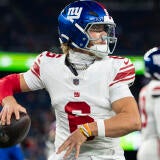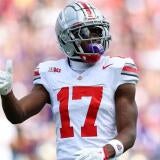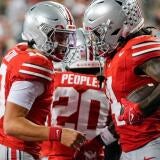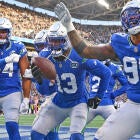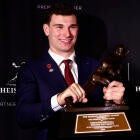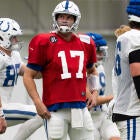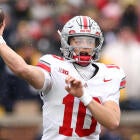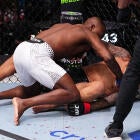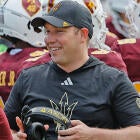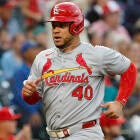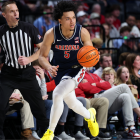NFL Draft: Grading the best, worst, and greatest value picks for every team's GM
As the 2021 NFL Draft nears, we dive into the history of every general manager's draft
The NFL Draft is a crapshoot. Even the league's top executives renowned for their drafting ability often get it wrong. The degree of difficulty makes the draft all the more important. It's the single most important (non-game) event in the NFL. One mistake can cripple a franchise. One home-run can birth a dynasty. That's what's at stake in the NFL Draft every year.
So, as the 2021 NFL Draft nears -- bringing with it the opportunity for all 32 NFL teams to find the next Tom Brady or Patrick Mahomes, or the next Ryan Leaf or Mitchell Trubisky -- we decided to take a look at all 32 general managers (or top decision makers) and their respective draft histories, breaking it down with their best, worst, and greatest value picks.
But before we begin, a few notes about the list:
- UDFAs were not included.
- GMs with multiple stints on their resume were given credit for picks they made with both their former and current teams.
- A draft pick having an impact with the team that drafted him was given more weight than a draft pick who failed to develop with his original team but blossomed with a new team.
- In the event where a GM's best draft pick was also his best value pick, I still tried to pick two separate players, even when one player fit both categories, for the sake of variety.
- Some GMs are entering the upcoming draft without prior experience in charge of a draft. Others were the top executive, but worked under a coach who had complete authority. This can make compiling a list like this complicated. I tried my best to use common sense. Unique circumstances will be noted.
- When looking at each GM's worst pick, bad players drafted in the first round were given more weight than bad players drafted after Round 1. Every GM has drafted a player in the mid-to-late rounds that didn't pan out. It's not at all uncommon. That doesn't make it their worst draft pick. It's worse to whiff on a first-round pick even if the player developed into a mediocre player than it is to miss on a fifth-round pick who never played in a game for that team. You won't find many "worst picks" that involve someone drafted after Rounds 1 and 2.
- When looking at best picks, positional value mattered. I didn't give Dave Gettleman credit for drafting either Christian McCaffrey or Saquon Barkley, even though they are tremendous players. Those weren't smart picks. So, it shouldn't come as a surprise to hear that a ton of quarterbacks are on this list.
OK, onto the list itself.
Arizona Cardinals -- GM Steve Keim
Best pick: Kyler Murray, QB, No. 1 in 2019
Worst pick: Jonathan Cooper, OG, No. 7 in 2013
Best value: Tyrann Mathieu, S, No. 69 in 2013
Keim, the Cardinals' general manager from 2013-19, breathed new life into his tenure by using the first-overall pick on Kyler Murray last year even though he traded up for Josh Rosen at No. 10 the year prior. Not only was he able to flip Rosen for a second-round pick, but he also happened to find the Cardinals' next franchise quarterback in Murray. It's only been one season, but Murray appears to be the answer at the most important position in all of sports.
For worst pick, the other player considered was Robert Nkemdiche, who in three seasons with the Cardinals generated only 4.5 sacks and an approximate value (per Pro Football Reference) of six. But Cooper was given the edge over Nkemdiche because he was picked higher (No. 7 compared to No. 29). Despite being a top-10 pick, Cooper lasted only two seasons in Arizona.
Meanwhile, Mathieu at No. 69 overall is a tremendous value pick. Mathieu might become better known for his contributions in Kansas City after helping the Chiefs win a Super Bowl, but from 2013-17 in Arizona, he blossomed into one of the league's top versatile defensive players, garnering an All-Pro nod in 2015 and playing a starring role on two good Bruce Arians teams. Two other great value picks? John Brown at No. 91 in 2014 and David Johnson at No. 86 in 2015.
Atlanta Falcons -- GM Thomas Dimitroff
Best pick: Matt Ryan, QB, No. 3 in 2008
Worst pick: Peria Jerry, IDL, No. 24 in 2009
Best value: Grady Jarrett, IDL, No. 137 in 2015
Hired back in 2008, Dimitroff has made his share of great picks. The decision for best pick came down to Matt Ryan at No. 3 in 2008 and Julio Jones at No. 6 in 2011. While Jones is the better player at his position group, Ryan plays a far more valuable position and won an MVP over Tom Brady. For most of his career, he's been a top-10 quarterback. That's why he gets the nod over Jones.
It was easier to identify Dimitroff's worst pick: Peria Jerry at No. 24 in 2009. Jerry retired after only five seasons. Two picks after the Falcons took Jerry, the Packers took Clay Matthews.
In terms of value, getting Grady Jarrett in the fifth-round has proven to be especially valuable. He's developed into one of the league's top interior defensive linemen.
Baltimore Ravens -- GM Eric DeCosta
Best pick: Lamar Jackson, QB, No. 32 in 2018
Worst pick: Breshad Perriman, WR, No. 26 in 2015
Best value: Marshal Yanda, OG, No. 86 in 2007
From 2012-18, DeCosta was the assistant general manager to the great Ozzie Newsome. From 2009-11, he was the director of player personnel. From 2003-08, he was the director of college scouting. It wasn't until last year's draft that he was the Ravens' GM. So, I gave DeCosta partial credit for the Ravens' drafting since 2003, otherwise, we'd only be looking at one draft, which isn't fun or fair given we have no idea how those players will continue to develop. But I did try to pick more recent draft picks since DeCosta's influence grew over the years.
The best pick then was easy. Lamar Jackson just won MVP. He plays quarterback. He was taken recently. The one player robbed? Terrell Suggs -- selected 10th back in 2003. For those wondering, Ed Reed was drafted in 2002.
Finding the worst pick wasn't easy. This team drafts remarkably well. Breshad Perriman, though, was a first-round pick who was let go after only two injury-plauged seasons. That said, Perriman appears to be a late bloomer, because he's coming off a career-best season in Tampa Bay. But he didn't contribute at all in two seasons in Baltimore, accumulating only 576 receiving yards. Anytime a first-round pick is let go after two years, it's a bad pick. Other players considered: Sergio Kindle, the No. 43 pick in 2010 who played in only three games for the Ravens, and Dan Cody, the No. 53 pick in 2005 who played in only two games for the Ravens. But Perriman was given the edge because he was taken in the first round and because it happened more recently.
Marshal Yanda, who just retired, was an easy choice in terms of value. He was one of the best guards in football and the Ravens found him in the third round.
Buffalo Bills -- GM Brandon Beane
Best pick: Tremaine Edmunds, LB, No. 16 in 2018
Worst pick: Harrison Phillips, IDL, No. 96 in 2018
Best value: Devin Singletary, RB, No. 74 in 2019
Brandon Beane's only been in charge since 2017 and he was hired after the 2017 draft, so we aren't working with that much data here -- only the past two years. Tre'Davious White isn't eligible. He was drafted by Doug Whaley.
We're therefore forced to make some projections. Tremaine Edmunds has flashed plenty of potential in two seasons, but don't be surprised if either Ed Oliver, Josh Allen, or Cody Ford end up becoming Beane's best pick over the past two years. It's simply too early to know how all of these players are going to develop. Devin Singletary was impressive as a rookie, adding more evidence that teams shouldn't be using first-round picks on running backs when they can find guys like Singletary in the middle rounds. It was very difficult to find a bad pick -- again, mostly because we just don't know how these players will develop. I do not think Harrison Phillips in the third round was a bad pick. He got hurt early last year. But through two years, he's the only player Beane has drafted in the first three rounds who hasn't made much of an impact. Working with a small sample, I was forced to go with Phillips. 2020 is a big year for him, but it might be tough for him to make a big splash with players like Star Lotulelei and Ed Oliver ahead of him on the depth chart.
Carolina Panthers -- GM Marty Hurney
Best pick: Cam Newton, QB, No. 1 in 2011
Worst pick: Jeff Otah, OT, No. 19 in 2008
Best value: Josh Norman, CB, No. 143 in 2012
Marty Hurney re-assumed control of the Panthers in 2017 after a previous stint in charge from 2002-12, which means Hurney's best pick comes down to: Julius Peppers at No. 2 in 2002, Cam Newton at No. 1 in 2011, or Luke Kuechly at No. 9 in 2012. Peppers is a Hall of Famer. Kuechly was the best linebacker of the past decade (along with Bobby Wagner). But Newton won out because of the position he plays. He won an MVP. He took the Panthers to a Super Bowl. At his peak, he was playing at a Hall of Fame level. Not to mention, it's not like taking Newton at No. 1 was a no-brainer. Picking between Newton, Blaine Gabbert, and Jake Locker at the top of the draft was once considered the "toughest call in football." The Panthers got it right there.
Jeff Otah was deemed the worst pick because he was taken 19th overall, one spot ahead of Aqib Talib. Not to mention, the Panthers traded up for Otah, giving up additional assets to take a player who played in only 29 games in his career. And if the Panthers really wanted an offensive tackle, Duane Brown was taken seven picks later. There were a lot of bad picks to choose from, but I stuck with Otah.
Getting Josh Norman in the fifth round was an absolute steal. His Panthers career was punctuated by a first team All-Pro nod in 2015.
Chicago Bears -- GM Ryan Pace
Best pick: Eddie Goldman, IDL, No. 39 in 2015
Worst pick: Mitchell Trubisky, QB, No. 2 in 2017
Best value: Eddie Jackson, S, No. 112 in 2017
This is one of those cases where the GM's best value pick and best pick were the same player in Eddie Jackson. But for the sake of variety, I listed Jackson as the best value pick (getting an All-Pro safety in the fourth round is a steal) and Eddie Goldman, a second-round pick in 2015, as the best pick. Both players are studs on a great Bears defense.
The worst pick is obvious. Pace's decision to trade up one spot to make Mitchell Trubisky the first quarterback off the board in a draft featuring Patrick Mahomes and Deshaun Watson is a franchise-altering mistake. Trubisky is a far better player than Kevin White, the No. 7 pick in 2015 who played 14 games for the Bears, but the Trubisky pick was far more costly. The Bears recovered just fine from the White pick. It remains to be seen if they will recover from the Trubisky mistake.
Cincinnati Bengals -- owner Mike Brown
Best pick: Andrew Whitworth, OT, No. 55 in 2006
Worst pick: Ki-Jana Carter, RB, No. 1 in 1995
Best value: Geno Atkins, IDL, No. 120 in 2010
Officially, the Bengals don't have a general manager. Although director of player personnel Duke Tobin is heavily involved in the draft process, for simplicity's sake, it was easier to just look at owner Mike Brown's drafting history. Brown has owned the Bengals since 1991 and all indications suggest he has at least some authority over the draft process. So, there were a ton of drafts to sort through.
Whitworth, who has been one of the sport's top left tackles, is probably the Bengals' best pick since Brown took over. Surprisingly, the Bengals let him walk in free agency and sign with the Rams in 2017. There will be those clamoring for Chad Johnson or Corey Dillon, but I went for the player who played an important, but often unheralded position. The only player I almost substituted for Whitworth was Willie Anderson, another offensive lineman.
Their worst pick was Ki-Jana Carter with the top overall selection in the 1995 draft. Consider the players drafted immediately after him: Tony Boselli and Steve McNair. An argument can certainly be made that Akili Smith with the No. 3 pick in 1999 was a worse selection, but at least the Bengals took a quarterback. They had the right idea. They just took the wrong quarterback. Carter, a running back, rushed for only 747 yards in his career with the Bengals. Furthermore, the Bengals traded up for Carter, who had his career derailed by injuries.
As for their best value pick, it's tough to do much better than a defensive tackle of Geno Atkins' caliber in the fourth round. He was Aaron Donald before Donald revolutionized the gap-penetrating three-technique interior defensive lineman role.
Cleveland Browns -- GM Andrew Berry
Best pick: Myles Garrett, EDGE, No. 1 in 2017
Worst pick: Corey Coleman, WR, No. 15 in 2016
Best value: Joe Schobert, LB, No. 99 in 2016
Berry is a first-time GM. So this one wasn't as simple as the others. From 2016-18, he was with the Browns as VP of player personnel. In 2019, he was with the Eagles as VP of football operations. So, let's use that four-year window.
Myles Garrett was the obvious pick at No. 1 three years ago, but also the right one. He has 30.5 sacks in 37 career games. I considered going with Baker Mayfield, but his 2019 season wasn't good enough for him to edge Garrett, even though Mayfield plays a more valuable position. It wouldn't surprise me if Mayfield eventually overtook Garrett as he continues to develop. Corey Coleman never turned into a starting-caliber receiver the Browns thought they were getting in the top half of the first round in 2016. He lasted only two seasons. Finally, Joe Schobert's career in Cleveland came to an end this offseason, but he was a great pick at No. 99 with the fourth-most combined tackles from 2017-19 among all players. The Browns got all they could've ever hoped for out of Schobert before he departed in free agency.
Dallas Cowboys -- Owner/GM Jerry Jones
Best pick: Troy Aikman, QB, No. 1 in 1989
Worst pick: Morris Claiborne, CB, No. 6 in 2012
Best value: Dak Prescott, QB, No. 135 in 2016
When it comes to Jerry Jones' time as the Cowboys' owner, there are two picks in contention for best pick. The first is Troy Aikman at No. 1 overall in 1989, the first year of Jones' ownership. The second is Emmitt Smith at No. 17 in 1990. Smith was a better running back than Aikman was a quarterback, but the edge was given to Aikman because he just happened to play a more important position, which means he mattered more to the Cowboys. Quarterbacks just matter more than running backs.
For worst pick, I went with Morris Claiborne at No. 6 in 2012 even though there were some other worthy candidates -- from Taco Charlton at No. 28 in 2017, to Bobby Carpenter at No. 18 in 2006, to David LaFleur at No. 22 in 1997. But the Claiborne pick was a disaster. For one, the Cowboys traded up for him. Two, if the Cowboys wanted to trade up for a corner, they could've taken Stephon Gilmore, arguably the best corner in football right now, over Claiborne. Gilmore went to the Bills four picks later. Two other notable players on the board who went in the first half of the first round: Luke Kuechly and Fletcher Cox.
Jones' best value pick was easy. Getting a franchise-caliber quarterback like Dak Prescott in the fourth round is awesome value (now they should pay him). It's worth noting, however, that Jones wanted to take Paxton Lynch and was not happy when the Broncos took him in the first round (more on that in a second). He got lucky there.
Finally, if UDFA's were included, Jones' best value pick would've been Tony Romo.
Denver Broncos -- GM John Elway
Best pick: Von Miller, EDGE, No. 2 in 2011
Worst pick: Paxton Lynch, QB, No. 26 in 2016
Best value: Danny Trevathan, LB, No. 188 in 2012
Lynch went to the Broncos at No. 26 in 2016. He did not turn out to be the Broncos' franchise-caliber quarterback or even a backup. So, he represents John Elway's worst pick as the Broncos' general manager. But Elway did well to get Von Miller at No. 2 in 2011. At the time, Elway was the director of player personnel and Brian Xanders was the GM, but I decided to give Elway credit anyway. Since 2011, Miller leads the league in sacks with 106 and he played a starring role on the Broncos' championship team in 2015. Elway's best value pick was Trevathan in the sixth round. He's been a quality linebacker with both the Broncos and Bears.
Detroit Lions -- GM Bob Quinn
Best pick: Kenny Golladay, WR, No. 96 in 2017
Worst pick: Teez Tabor, CB, No. 53 in 2017
Best value: Graham Glasgow, OG/OC, No. 95 in 2016
Kenny Golladay, one of the best young wideouts in football, is both Bob Quinn's best pick and his best value pick. But for the sake of variety, Graham Glasgow, a third-round pick who started 58 games over the past four seasons before earning a deal with the Broncos this offseason, was named Quinn's best value pick. As for Quinn's worst pick, it's Teez Tabor in the second round. In two years, Tabor has seldom contributed. After getting cut by the Lions in August and landing with the 49ers, Tabor didn't take part in a real NFL game last year.
Green Bay Packers -- GM Brian Gutekunst
Best pick: Jaire Alexander, CB, No. 18 in 2018
Worst pick: Josh Jackson, CB, No. 45 in 2018
Best value: Marquez Valdes-Scantling, WR, No. 174 in 2018
As Ted Thompson's successor, Gutekunst has only been in charge of two drafts. So, we're working with a small sample size. Any of his bad picks could develop into quality players in Year 2 or 3. Keep that in mind when seeing Josh Jackson's name listed under worst pick. No, Jackson hasn't developed into a quality corner, but he still has time to improve. Rashan Gary, last year's first-round pick, wasn't great in 2019, but he should be given more than one season to blossom. As for Gutekunst's best pick, Jaire Alexander already looks like a stud at cornerback. Meanwhile, Marquez Valdes-Scantling might not be a star, but with 1,033 yards and four touchdowns across two seasons, he was a solid value pick in the fifth round.
Houston Texans -- Coach/GM Bill O'Brien
Best pick: Deshaun Watson, QB, No. 12 in 2017
Worst pick: Kevin Johnson, CB, No. 16 in 2015
Best value: D.J. Reader, IDL, No. 166 in 2016
Bill O'Brien wasn't officially named GM until this offseason. He's worked under multiple general managers, all of whom he's outlasted. So, even though he hasn't necessarily been the GM during his entire coaching stint in Houston, we're gonna have to use all of the data during his tenure, which began in 2014.
The best pick is obvious. Nobody is going to argue against getting a quarterback like Deshaun Watson at No. 12. The worst pick is Kevin Johnson, a corner who was selected before Byron Jones and Marcus Peters. Johnson is already onto his third NFL team. For best value, I went with D.J. Reader in the fifth round. He plays an unsexy position on the interior of the defensive line, but he's proven to be good at it. Getting a quality starter is really the best teams can hope for that late in the draft and Reader just got paid in free agency by the Bengals.
Indianapolis Colts -- GM Chris Ballard
Best pick: Quenton Nelson, OG, No. 6 in 2018
Worst pick: Quincy Wilson, CB, No. 46 in 2017
Best value: Darius Leonard, LB, No. 36 in 2018
Hired fairly recently, we don't have that much data to work with when it comes to Chris Ballard's tenure as Colts GM. His best pick is Quenton Nelson, who is already one of the top guards in the league. Best value went to Darius Leonard, an early second-round pick who earned first team All-Pro honors as a rookie. Worst pick went to Quincy Wilson, a second-round pick in 2017. Wilson has failed to emerge as a useful contributor for the Colts. Other contenders for worst pick? Kemoko Turay and Tyquan Lewis. Wilson won out (lost out?) because he's been around longer than both 2018 second-round picks and was the highest pick.
Jacksonville Jaguars -- GM David Caldwell
Best pick: Jalen Ramsey, CB, No. 5 in 2016
Worst pick: Luke Joeckel, OT, No. 2 in 2013
Best value: Yannick Ngakoue, EDGE, No. 69 in 2016
If only David Caldwell had been able to draft a quarterback -- because both his best pick and his best value pick are great talents who have been wasted due to subpar quarterback play. In Ramsey, the Jaguars had the league's top young corner before they turned him into two first-round picks. In Ngakoue, the Jaguars have a great young edge rusher (who wants to be traded).
For worst pick, Blake Bortles was the obvious pick. But I went with Luke Joeckel at No. 2 in 2013 because he was drafted one spot behind Eric Fisher (a solid left tackle) and two spots ahead of Lane Johnson (a great right tackle). They missed out on two clear upgrades over Joeckel, who never cashed in on his potential. Meanwhile, it's not like the Jaguars missed out on a great quarterback at the top of the 2014 draft, when they took Bortles at No. 2. Johnny Manziel was the next quarterback taken. Then there was Teddy Bridgewater, who was never in consideration at the top of the first round. Jimmy Garoppolo was the best quarterback drafted, but again, he was never in play at No. 2. Both Joeckel and Bortles were bad picks. But the Bortles pick is more forgivable.
Another contender for worst pick is Leonard Fournette at No. 4 in 2017 with both Mahomes and Watson on the board. But because Tom Coughlin was ultimately in charge from 2017-19, I didn't include the drafts in that three-year window.
Kansas City Chiefs -- GM Brett Veach
Best pick: Mecole Hardman, WR, No. 56 in 2019
Worst pick: Breeland Speaks, EDGE, No. 46 in 2018
Best value: Juan Thornhill, S, No. 63 in 2019
Brett Veach has only been in charge (with Andy Reid, of course) since the 2018 draft. John Dorsey was fired after the 2017 draft, which means, we can't give Veach total credit for Mahomes. For Veach, we're only looking at the past two drafts. No Mahomes. No Tyreek Hill. And so on. Those picks obviously reflect well on Veach and Reid, but for the purposes of this exercise, we're only looking at the drafts with Veach as the GM.
His best pick is Mecole Hardman at No. 56 last year, an example of drafting a good player who is also a perfect fit. Hardman's speed is perfectly weaponized in Kansas City. As a rookie, he recorded 555 yards and six touchdowns from scrimmage. Expect those numbers to climb in Year 2. His worst pick was Breeland Speaks at No. 46 in 2018. Speaks was the Chiefs' first pick in the 2018 draft. He notched only 1.5 sacks in 2018 and missed all of the 2019 season. Best value went to Juan Thornhill at No. 63 last year. Thornhill was really developing nicely until an injury ended his season before the playoffs.
Las Vegas Raiders -- coach Jon Gruden, GM Mike Mayock
Best pick: Aqib Talib, CB, No. 20 in 2008
Worst pick: Gaines Adams, EDGE, No. 4 in 2007
Best value: Hunter Renfrow, WR, No. 149 in 2019
For this, I decided to include Jon Gruden's years as the Buccaneers' coach since looking at one year of data with Mike Mayock wouldn't be too interesting. But I did not include Gruden's first stint with the Raiders since Al Davis was in charge.
That leaves Aqib Talib as Gruden's best pick while with Tampa Bay. Gaines Adams, who tragically passed away in 2010, at No. 4 in 2007, was his worst pick (he was traded away after only 2.5 seasons in Tampa Bay). And Hunter Renfrow was his best value pick. As a fifth-round rookie, Renfrow caught 49 passes for 605 yards and four touchdowns. One player who could've been swapped in for Renfrow? Maxx Crosby, who exploded for 10 sacks as a fourth-round rookie.
Los Angeles Chargers -- GM Tom Telesco
Best pick: Joey Bosa, EDGE, No. 3 in 2016
Worst pick: Forrest Lamp, OG, No. 38 in 2017
Best value: Keenan Allen, WR, No. 76 in 2013
There's an argument to be made that Keenan Allen is both Tom Telesco's best pick and his best value pick, but Joey Bosa with 40 sacks in four seasons also makes a ton of sense as his best pick. For worst pick, I went with Forest Lamp, a high second-round pick who has started only two games in three seasons (due in part to injuries). 2016 third-round pick Max Tuerk, who played in one game with the Chargers, was another candidate for worst pick.
Los Angeles Rams -- GM Les Snead
Best pick: Aaron Donald, IDL, No. 13 in 2014
Worst pick: Greg Robinson, OT, No. 2 in 2014
Best value: Cooper Kupp, WR, No. 69 in 2017
Best pick was easy. It's Aaron Donald, the best football player not named Patrick Mahomes. Worst pick also wasn't hard. Greg Robinson at No. 2 in 2014 did not work out, even though Robinson recently emerged as a startable offensive tackle. He remains unsigned after an arrest in February. Another contender for worst pick was Tavon Austin at No. 8 in 2013. Finally, best value was more difficult to identify with more than one worthy selection. Janoris Jenkins was a second-round pick in 2012, the same year the Rams landed Trumaine Johnson in the third round. But I went with Kupp, who in three years is averaging 865 yards and seven touchdowns per season even though he's missed nine games in that span.
Miami Dolphins -- GM Chris Grier
Best pick: Laremy Tunsil, OT, No. 13 in 2016
Worst pick: Charles Harris, EDGE, No. 22 in 2017
Best value: Xavien Howard, CB, No. 38 in 2016
The tricky part with Chris Grier and the Dolphins is that they've traded away some of the best players they've drafted -- like Laremy Tunsil and Minkah Fitzpatrick. I went with Tunsil as his best pick because Tunsil contributed more as a member of the Dolphins and because he fetched a bigger return as a trade piece (two first-round picks). Fitzpatrick is a better player than Tunsil, but he spent only one season plus a few weeks of his second season before getting traded, he blossomed after leaving Miami for Pittsburgh, and he netted only one first-round pick in return.
For best value, Xavien Howard, a second-round pick in 2016, made a ton of sense. There's a reason he's the second-highest-paid corner in football. For worst pick, I went with Charles Harris (No. 22 in 2017), who has 3.5 sacks in three seasons.
Minnesota Vikings -- GM Rick Spielman
Best pick: Adrian Peterson, RB, No. 7 in 2007
Worst pick: Christian Ponder, QB, No. 12 in 2011
Best value: Danielle Hunter, EDGE, No. 88 in 2015
No need to make this overly complicated. Adrian Peterson is the best running back of his generation. He's Rick Spielman's best pick. There's an argument to be made that Stefon Diggs in the fifth round is his best value pick, but I opted for Danielle Hunter in the third round. He ranks sixth in sacks since he entered the league in 2015. For worst pick, Ponder, taken one pick after J.J. Watt, was never good at any point in his career. One round later, quality quarterbacks like Andy Dalton and Colin Kaepernick were drafted.
New England Patriots -- Football czar Bill Belichick
Best pick: Tom Brady, QB, No. 199 in 2000
Worst pick: Dominique Easley, IDL, No. 29 in 2014
Best value: Rob Gronkowski, TE, No. 42 in 2010
Tom Brady's selection doesn't need to be justified. Neither does Rob Gronkowski's. It's remarkable the Patriots drafted the best quarterback and tight end (arguably) in NFL history with pick Nos. 199 and 42. Bill Belichick's worst pick was a bit more difficult to find -- not because Belichick hasn't made any bad picks (like all decision makers, he's made plenty of bad decisions), but because he has a few really bad selections. I was torn between Dominique Easley at No. 29 in 2014 and Sony Michel at No. 31 in 2018. The Michel pick was bad because the Patriots used their first pick on a running back -- and took the wrong one with Nick Chubb sitting there. Not to mention, they could've drafted Lamar Jackson. In hindsight, with Brady leaving this offseason, that would've been a smart move. But I went with Easley because Michel has at least played good football at times while Easley was a disaster during his entire two-year run in New England.
New Orleans Saints -- GM Mickey Loomis
Best pick: Cameron Jordan, DE, No. 24 in 2011
Worst pick: Johnathan Sullivan, IDL, No. 6 in 2003
Best value: Jahri Evans, OG, No. 108 in 2006
Man, it was tough to settle on only one best pick and one best value pick considering just how long Mickey Loomis has been the Saints' GM and how many great players he's drafted. Cameron Jordan ended up being Loomis' best pick with 87 sacks in nine seasons, 40.5 of which have come in the past three seasons. He's still going strong. Best value was a tough call with Michael Thomas, Jimmy Graham, Marques Colston, and Alvin Kamara as worthy picks, but Jahri Evans, who was named First Team All-Pro four times in his career, was the clear winner. Loomis' worst pick, Johnathan Sullivan, lasted only three years in New Orleans.
New York Giants -- GM Dave Gettleman
Best pick: Star Lotulelei, IDL, No. 14 in 2013
Worst pick: Vernon Butler, IDL, No. 30 in 2016
Best value: Trai Turner, OG, No. 92 in 2014
Remember, Dave Gettleman's draft history with the Panthers from 2013-17 was also considered. In the end, all three of the picks were from his Carolina years. The main takeaway should be that Gettleman isn't that good at drafting.
His best pick was Star Lotulelei at No. 14 in 2013, a very unsexy pick, but Lotulelei has been a very consistent and productive player throughout his entire career. For those that think Christian McCaffrey was his best pick, I just couldn't reward a GM for taking a running back in the top 10 with both Patrick Mahomes and Deshaun Watson on the board.
His best value pick was Trai Turner (recently traded to the Chargers), who has made the Pro Bowl in five of his six NFL seasons. That's good value for a third-round pick.
Worst pick is where it gets interesting. I was tempted to put Saquon Barkley, the No. 2 pick in the 2018 draft, here, because taking a running back at No. 2 in the modern NFL is ridiculous, but Barkley is too good of a player for me to list him here. I was tempted to select Kelvin Benjamin, the 28th overall pick in 2014, but Benjamin did at least experience success in his first two seasons with the Panthers -- but taking him before receivers like Davante Adams, Allen Robinson, Jarvis Landry, and John Brown still isn't a justifiable decision. I almost made the case for Kony Ealy, the 60th pick in 2014, but as a late second-round pick, that felt like too much of a reach. I landed on Vernon Butler, the 30th pick in 2016, who posted 32 combined tackles, seven tackles for loss, and six sacks in 2019. Unfortunately, while those are all fine numbers, they were career-highs for Butler, whose previous career-highs in those categories were 19 combined tackles, two tackles for loss, and 1.5 sacks. One decent season doesn't justify the pick at the end of the first round.
New York Jets -- GM Joe Douglas
Best pick: Carson Wentz, QB, No. 2 in 2016
Worst pick: Sidney Jones, CB, No. 43 in 2017
Best value: Isaac Seumalo, OG, No. 79 in 2016
Joe Douglas has never been a GM before, so I was only looking at the Eagles' draft picks between 2016-19, when Douglas was the Eagles' VP of player personnel. So, it's a small sample size that reveals more about Howie Roseman than Douglas.
But the best Eagles pick in the span was Carson Wentz, a legitimate franchise quarterback when healthy. Finding a great Eagles value pick in that period of time wasn't easy. Candidates ranged from Jalen Mills (seventh-round pick in 2016) to Isaac Seumalo (third-round pick in 2016) to Halapoulivaati Vaitai (fifth-round pick in 2016) to Isaac Seumalo (third-round pick in 2016) Mills was taken the latest, but he's probably the worst player out of the three. Vaitai is probably the better player than Seumalo, but he didn't play as often due to the Eagles' surplus at offensive tackle -- plus, he departed in free agency this year. So, I went with Seumalo, who emerged as a full-time starter this past season and played at an above-average level. He should be there for the foreseeable future. As for worst pick, Sidney Jones has seldom seen the field with only 22 appearances and eight starts since his selection in the second round three years ago. He was a risk when the Eagles took him. It hasn't worked out so far.
Philadelphia Eagles -- GM Howie Roseman
Best pick: Fletcher Cox, IDL, No. 12 in 2012
Worst pick: Danny Watkins, OG, No. 23 in 2011
Best value: Jason Kelce, OC, No. 191 in 2011
For Howie Roseman, we're going to use his entire run in charge of the Eagles, otherwise we'd pretty much be using the same players as we did for Joe Douglas. Just remember that during Roseman's time as the GM and VP of football operations (2010-present), the coaches (Andy Reid and Chip Kelly) often had personnel authority.
The best pick was Fletcher Cox at No. 12 in 2012. Cox has been a marvel on the interior of the Eagles' defensive line, posting productive sack numbers despite his position (48 sacks in eight seasons). The best value pick was Jason Kelce. This one was easy. Kelce has been named first team All-Pro three times in nine seasons despite being a sixth-round pick. For worst pick, I went with Danny Watkins, a pick that Roseman took responsibility for. Watkins lasted two years in Philadelphia. Making matters worse, Cameron Jordan was taken with the next pick.
Pittsburgh Steelers -- GM Kevin Colbert
Best pick: Ben Roethlisberger, QB, No. 11 in 2004
Worst pick: Jarvis Jones, EDGE, No. 17 in 2013
Best value: Antonio Brown, WR, No. 195 in 2010
Kevin Colbert, with the Steelers since 2000, has made a ton of great picks, but none were better than Ben Roethlisberger at No. 11 in 2004. Best value was also an easy choice. Antonio Brown wasn't picked until No. 195 in 2010, but he ended up becoming one of the best receivers of the decade. As for Senquez Golson being the worst pick, I've tried to only pick first-rounders because the bust rate for players taken after Round 1 is far higher, but considering Golson never played a game for the Steelers, he was a suitable choice. As for Jarvis Jones, in four seasons with the Steelers, he registered only six sacks.
San Francisco 49ers -- GM John Lynch
Best pick: Nick Bosa, EDGE, No. 2 in 2019
Worst pick: Reuben Foster, LB, No. 31 in 2017
Best value: George Kittle, TE, No. 146 in 2017
Nick Bosa was the obvious choice at No. 2 behind Kyler Murray a year ago, but Lynch still gets credit for it. Bosa looks like a star already. Getting George Kittle, the best all-around tight end who has the best chance to become the next Gronk, in the fifth round is incredible value. As for Reuben Foster, there were red flags before the 2017 draft, which caused him to fall to the end of the first round. Still, the 49ers traded back into the first round to take Foster, whose career has been marred by injuries and off-the-field issues. He lasted only two seasons and 16 total games with the 49ers.
Seattle Seahawks -- GM John Schneider
Best pick: Russell Wilson, QB, No. 75 in 2012
Worst pick: Malik McDowell, IDL, No. 35 in 2017
Best value: Richard Sherman, CB, No. 154 in 2011
John Schneider has done well to find great talent in the mid-to-late rounds, from Russell Wilson to Richard Sherman. Wilson and Sherman were easy picks in their respective categories, but a few notable value picks who missed the cut included: Jarran Reed at No. 49 in 2016, Frank Clark at No. 63 in 2015, Tyler Lockett at No. 69 in 2015, J.R. Sweezy at No. 225 in 2012, K.J. Wright at No. 99 in 2011, and Golden Tate at No. 60 in 2010. Not to mention, he also drafted Earl Thomas and Bobby Wagner. It's almost like the Seahawks have been one of the league's best teams over the past decade for a reason.That said, the Malik McDowell pick backfired in a major way. He was their top pick in the 2017 draft and was supposed to be a Michael Bennett replacement, but due to a non-football injury, he never played in a game for the team. The Rashaad Penny pick at No. 27 in 2018 also deserves a shoutout, because it has never made any semblance of sense. I wanted to put Penny above McDowell, but at least Penny is still on the team and could, in theory, develop into a useful player.
Tampa Bay Buccaneers -- GM Jason Licht
Best pick: Mike Evans, WR, No. 7 in 2014
Worst pick: Roberto Aguayo, K, No. 59 in 2016
Best value: Chris Godwin, WR, No. 84 in 2017
Jason Licht certainly knows how to draft wide receivers. Last year, Mike Evans and Chris Godwin combined for 2,490 yards and 17 touchdowns. He should not, however, ever trade up again for a kicker, like he did with Roberto Aguayo ... IN THE SECOND ROUND.
Tennessee Titans -- GM Jon Robinson
Best pick: Jack Conklin, OT, No. 8 in 2016
Worst pick: Kevin Dodd, DE, No. 33 in 2016
Best value: Kevin Byard, S, No. 64 in 2016
Robinson, in charge of the Titans since 2016, had his best draft in his first season, when he sold the top pick to the Rams for a king's ransom. He got Jack Conklin, who just departed in free agency, at No. 8. Then, he got Kevin Byard, an All-Pro safety, in the third round. It's worth noting the 2016 draft also resulted in Derrick Henry's selection in the second round. Then again, Robinson's worst pick also came in 2016. Kevin Dodd, taken at the top of second round, lasted only two seasons in Tennessee with one total sack. Corey Davis at No. 5 in 2017 was a reach in hindsight, but he's at least shown brief glimpses with the potential to still morph into more.
Washington Redskins -- coach Ron Rivera
Best pick: Cam Newton, QB, No. 1 in 2011
Worst pick: Vernon Butler, IDL, No. 30 in 2016
Best value: Josh Norman, CB, No. 143 in 2012
Bruce Allen is finally gone. The Redskins brought in Ron Rivera to rebuild their team. They didn't hire a GM. So, let's look at Rivera's history with the Panthers. Most of these answers overlap with Hurney and Gettleman. Cam at No. 1 in 2011 was a great pick, even if injuries wrecked Cam's career with the Panthers at the end. Norman was unbelievable value in the fifth round. And Butler just never developed into a player worthy of selection in the first round.


